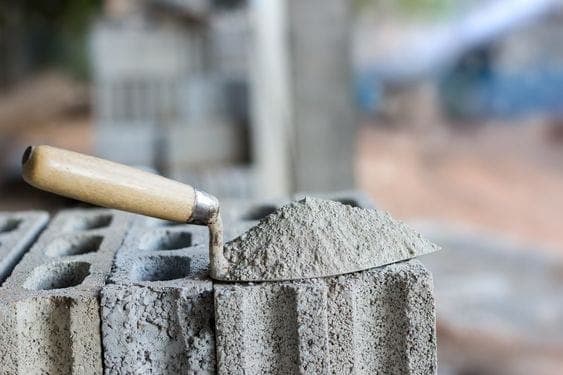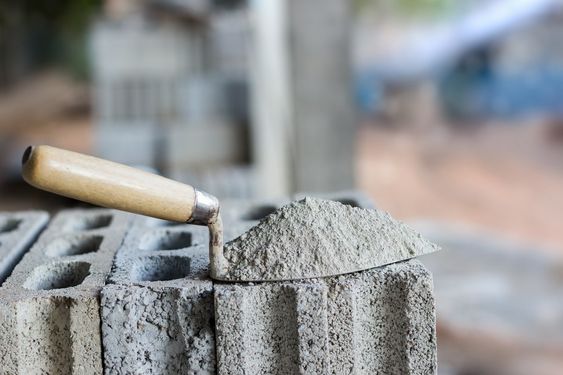
Cement is the most demanded construction material which is easily available in the local market all over the world. Every year thousands of tons of cement are produced to meet the demands of construction industry. Historically, lime and volcanic ash was used as an adhesive in construction, but nowadays cement has become most recognized adhesive material and used to construct both gigantic structures as well as small structures like homes.
Generally, cement is used to make the mortar or concrete and it helps them to achieve strength after final setting. Good cement not only provides higher strength to mortar or concrete, but it will also help to resist moisture and provides lifelong durability to the structure. Hence it is necessary to understand the properties of cement before you understand the mortar or concrete or its properties and uses.

Here we have discussed properties of cement. Properties of cement can be classified in two categories, one is physical properties of cement and second is chemical properties of cement. The properties of cement mostly depend on its composition i.e. raw materials, carefulness while burning and grinding process.
Properties of Cement
(a) Physical Properties of Cement
01. Fineness of Cement
Fineness of cement is a measure of the size of particles of cement. Fineness is measured by doing sieve analysis or air permeability method or by sedimentation method. In sieve analysis, the sizes of cement particles are measured and in air permeability test, fineness of cement is mostly measured by specific surface area.
For the particular weight of cement, higher the fineness of cement, higher the specific surface area of the cement. When water is added to the finer cement, higher specific surface area helps to increase the rate of hydration which ultimately results into the early and better development of strength.
To know more, read Fineness Test of Cement.
02. Soundness of Cement
Soundness is the ability of cement to retain its volume while hardening. Cement is tested for its soundness by Le Chatelier Test and Autoclave Test. To know more, read Soundness of cement. This is important, because if the volume increase or decrease after hardening, it will become difficult to use it.
03. Consistency of Cement
Consistency of cement is the ability of cement paste (cement + water) to flow under normal condition. Dry Mortar (mix of cement and sand) or Dry concrete (mix of cement, sand and aggregates) needs optimum water to comes into workable condition. Thus, optimum water-cement ratio should be maintained to get the workable cement paste.
Also Read:
Importance of Water-Cement Ratio in Concrete
How to Calculate Water-Cement Ratio
04. Strength of Cement
Cement hydrates, achives cohesion and gets strength after solidifying when mixed with water. Basically, it is cement, which makes mortar/concrete strong and durable. Hence in mortar/concrete, cement is the material which provides strength to them and make the structure durable and strong. Hence, It is advisable to check the strength of cement before it is being used for construction. To check the strength, read how to test the compressive strength of cement.
05. Setting Time of Cement
It is a time, in which water and cement react with each other and finally, the paste hardens. In other word, it is the time in which mortar or concrete should be prepared, transported, placed and hardened. At the time of preparation of mortar or concrete, when the water reacts with cement, the mix attains plasticity within the first 30 minutes. This time is known as initial setting time of cement. Cement paste in the form of mortar or concrete completely lose its plasticity generally after 10 hours (600 minutes) which is known as final setting time of cement. Hence initial and final setting time of cement should be checked to get the best quality of mortar or concrete work on site. To know in detail, read Setting Time of Cement.
06. Heat of Hydration
To use cement in any construction work, it is necessary to mix the cement with water. When water is mixed with cement, the reaction between the water and cement cause the generation of the heat. This process of heat generation is known as heat of hydration. It is very critical in mass concrete work or in work in hot climate.
To Know more, read heat of hydration.
07. Loss of Ignition (LOI)
Cement losses its weight when it is being heated at 900 to 1000 0C. This loss of weight upon heating is calculated as loss of ignition. Loss on ignition shows the pre-hydration or carbonation of cement due to prolonged or improper storage (exposure to atmosphere). Pre-hydration of cement reduce the strength of cement and influences the setting time of cement. Carbonation of cement causes a change in strength, porosity, pore size distribution, and chemistry in cement paste/concrete/mortar.
08. Bulk Density of Cement
It is the volume taken up by the cement plus any air trapped between the particles. Generally, cement has 1000 to 1300 Kg/Cum of bulk density.
09. Specific Gravity of Cement
Normally specific gravity is defined as the ratio between the weight of a given volume of material (cement) and weight of an equal volume of water. Generally, Portland cement have a specific gravity of value around 3.15. The value of specific gravity is change with change in type of cement.
(b) Chemical Properties of Cement
Cement contains multiple ingredients as its raw material like lime, silica, alumina, iron oxide etc. These ingredients interact with one another in the kiln during the manufacturing process and make a complex compound (Cement). The concrete or mortar should be recognized as best, if the chemical composition of the cement is well proportioned. Sometimes structures may fail to perform well during their service life. This happens due to the use of bad quality of cement during the construction.
Chemical properties or chemical composition of cement depend upon their limiting value in cement.
Followings are the usual composition limits of Portland cement.
| Sr No. | Oxide | Abbreviation | Composition in % (Content percentage) |
| 1 | Lime | CaO | 60-70 |
| 2 | Silica | SiO2 | 17-25 |
| 3 | Alumina | Al2O3 | 3-8 |
| 4 | Iron Oxide | Fe2O3 | 0.5-6.0 |
| 5 | Sulfur Trioxide | SO3 | 2.0-3.5 |
| 6 | Magnesia | MgO | 0.5-4.0 |
| 7 | Alkalis | Na2O & K2O | 0.3-1.2 |
| 8 | Loss on ignition | – | 1-2 |
| 9 | Insoluble Residue | – | 0.5 |
Main Chemical Compounds of Portland Cement
Portland Cement mainly compose of four basic chemical compounds.
01. Tricalcium silicate:
- Oxide composition: 3CaO.SiO2
- Abbreviation: C3S
- This compound helps cement to harden rapidly and is also responsible for initial set and early strength.
02. Dicalcium Silicate:
- Oxide composition: 2CaO.SiO2
- Abbreviation: C2S
- This compound helps cement to harden slowly and it is also responsible for increase in strength after one-week of age.
03. Tricalcium aluminate:
- Oxide composition: 3CaO.Al2O3
- Abbreviation: C3A
- This compound helps to develop strength in the first few days. It is responsible for hydration of cement and also responsible to generate high heat of hydration.
04. Tetracalcium aluminoferrite:
- Oxide composition: 4CaO.Al2O3.Fe2O3
- Abbreviation: C4AF
- This compound contributes in hydration process and slightly influences the strength of cement.
Main Chemical Compound of Portland Cement:
| Name of Compound | Chemical Composition | Usual Abbreviation | Percentage (%) |
| Tricalcium silicate | 3CaO.SiO2 | C3S | 51 |
| Dicalcium Silicate | 2CaO.SiO2 | C2S | 23 |
| Tricalcium aluminate | 3CaO.Al2O3 | C3A | 8 |
| Tetracalcium aluminoferrite | 4CaO.Al2O3.Fe2O3 | C4AF | 9 |
Secondary Chemical Compounds in Portland Cement
- Lime (CaO)
- Free lime (CaO) leads to expansion after hydration which results into the disintegration of hardened concrete.
- Magnesia (MgO): The excess amount of MgO leads to the expansion due to the hydration of MgO in hardened concrete.
- Na2O & K2O (Alkali Oxides)
- The excess amount of alkalis like Na2O & K2O leads to the alkali-aggregate reaction, which results in disruptive expansion.
- All the above properties are simultaneously required for its efficient and effective performance to give strength and life to the structure, without problems, repairs, maintenance, etc.
Must Read:
Field vs Laboratory Testing of Cement
Standard Consistency Test of Cement































